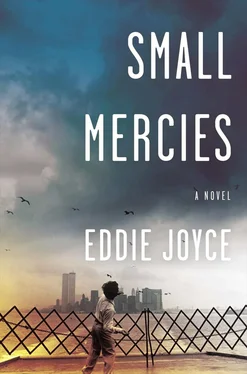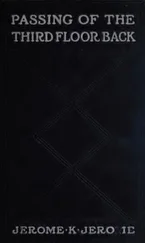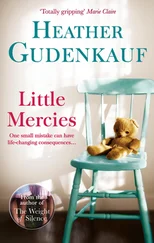“Really, you look fantastic.” She paused, refilled her glass. “You lucky bitch.”
Gail rolled her eyes in disagreement, but it was true; she looked better than she had ten years earlier. Before the kids, she’d been skinny, devoid of the curves that turned male heads. And three pregnancies had taken their toll: varicose veins, a stubborn pouch of fat in her lower stomach, a softening and slackening of the major muscles. Any attempts to coax her body back to leanness had always been thwarted by the demands of motherhood. She barely had time to brush her teeth, never mind spend forty-five minutes trying to imitate Jane Fonda doing aerobics in a garish body suit.
So she spent fifteen years as a frumpy, disheveled mess. Who cared? Not she and not Michael and that was all that really mattered.
Midway through her forties, her body had coalesced into a curvaceous version of its former self. Her thighs, her hips, her rear were all thicker but contoured; four years of walking at night had transformed fat into muscle. Her small bust had navigated the ravages of time and gravity far better than the showstoppers of Diana Landini and her big-busted cohorts; it was still only a handful of tit, but at least it was in the right place. She was no rare beauty, she knew that, but age, in its fickle generosity, had treated her well. There were a few wrinkles, a few gray hairs, but they conveyed a contrarian idea: well-worn beauty. Beauty that had survived.
It happened to men all the time — bit of gray or white bestowed an air of wisdom, compensated for any physical decline — but women were stuck with the absurd monotony of male desire: young and thin, except where it counted, thank you very much. Anyway, she’d lucked out. Time had touched her, but gently. And her eyes hadn’t changed at all. If anything, the gleam within had grown more brilliant. In jeans and a sweater — her standard attire — she was pleasant to look at. Maybe even desirable, she allowed herself, on her better days.
She noticed the looks men gave her. In the supermarket. In the street. Even at school. Mr. Torrenson, the high school baseball legend turned gym teacher, walking past her classroom a few times a day for no reason at all. Mr. Williams, the principal, dropping in on her classes “to observe her teaching method.”
Right. Observe her ass while she wrote on the chalkboard was more likely.
Men were so transparent, especially teachers. Last year at the faculty Christmas party, Torrenson, a mess of black chest hair sprouting out of his half-unbuttoned shirt, had put his hand on her ass in a dimly lit corner of the school cafeteria. He leaned down, his thick tongue sliding between ruby-stained teeth, and whispered in her ear.
“Good God, Gail. I’d love to take you to the Victory Motor Inn and toss you around a room for a few hours.”
Then his tongue landed in her ear, encasing it in warm, brackish drool.
She reached back, grabbed his meaty wrist, and removed it from her backside. She took a half step away. Her voice was low but firm.
“Danny, I think you’ve had too much to drink. You’re forgetting about your wife and kids.”
He grinned, the dopey wide smile of an inebriate, and moved off in the direction of Edna Adelstein, the frizzy-haired music teacher who’d grown accustomed to being his backup plan at such events. When Gail left shortly afterward, Torrenson’s left arm was draped over one of Edna’s ham-hock shoulders, a clear plastic cup holding a pint of thin red wine at his lips.
Torrenson’s advance hadn’t shocked Gail. Torrenson was a well-known lech. What surprised her was the lowness of it: The Victory Motor Inn? With its room-by-the-hour pricing and pink bedsheets? Quite an offer.
She never told Michael, couldn’t see any point. Torrenson was a pig, but not worth making a scene. And it was nice, in a way, to be desired. Gail had never encouraged that kind of attention, but it was flattering, she had to admit.
Maybe she should have told Michael, sparked a little jealousy in him. Let him know that other men had taken notice, even if he hadn’t.
* * *
He grew more and more distant as the summer progressed. Something had come between them. It wasn’t a woman, she was sure of that. But what could it be? She didn’t know and not knowing scared her as much as the gulf between them. She wanted the summer to end. She wanted to go back to work, establish some semblance of routine in the house.
One night, a little before Labor Day, she came home from Diana’s and Michael was outside on the back patio, grilling a sausage wheel and some peppers for dinner. He turned and smiled when she stepped outside.
“Hey, here you are,” she said.
“Hey, here I am.” He rotated a green bell pepper with tongs. “Long legs is home too. We can all have dinner together.”
“Great, I’ll open some wine,” she said, before stepping back inside, her mood a bit lighter. “Been a while.”
It was nothing. A late summer barbecue, sitting at the kitchen table while the light outside refused to die. Sausage and pepper sandwiches on fresh bread. Bobby had taken a shower, smelled like soap for once instead of sweat. Michael was his old self again, laughing and smiling, touching her bare leg under the table whenever Bobby said something goofy. The closed intimacy of family sharing a simple meal.
She’d worried for no reason. Michael had been in a funk, that was all. Gail sat there, floating from the wine and the return to normalcy. This is what she’d imagined the whole summer would be like. She took a sip of wine, looked absently out the window as a car braked in the street to let a neighborhood kid retrieve a Wiffle ball. By the time she turned back to the table, it had already started to fall apart.
“Coach Whelan,” Bobby was saying, “says that I’m gonna be the starting center this year. Probably team captain.”
The words came out in a panicky rush. His eyes searched for Gail’s, looking for support. She watched Michael, whose face betrayed nothing. But she knew it was bad.
“But if I play football, I have to sit out the first five games, including the Thanksgiving eve game, and I can’t be captain.”
Bobby looked at his father, awaiting a reaction. Gail swallowed.
“So, no football,” said Michael. “That’s what you’re saying.”
Bobby’s eyes shifted to meet hers.
“Well, I guess, umm, I can’t be captain if…”
“Even though you made a commitment, even though your teammates are relying on you. That doesn’t matter to you.”
Bobby reached for a glass of water, took a long sip.
“I don’t look at it that way, Dad. I’m the backup tight end. I barely play. I’m gonna start on the basketball team this year.”
Michael wasn’t listening, was staring at the window.
“You’d rather run around in your underwear playing a nigger’s game.”
“Michael!”
He pushed his chair away from the table and stood up.
“Michael, sit down, please,” she said. She glanced over at Bobby, who was fighting back tears and choking down anger at the same time.
“Why? He’s already made up his mind,” he said, waving a dismissive hand in Bobby’s direction. He walked out of the kitchen, out of the house. She turned back to Bobby, who was crying openly, on the verge of sobbing.
“Bobby, he didn’t mean that. He’s upset that you’re not playing football, that’s all. You should have told him earlier.”
“When?” Bobby asked, his head tilted sarcastically, a tick picked up from his father. He stood, embarrassed that he couldn’t stop crying.
“Bobby, sit down. Let’s finish eating.”
She reached a hand across the table, but he stormed off and a minute later, she heard the familiar boom of the Wu-Tang Clan coming from his room.
Читать дальше












